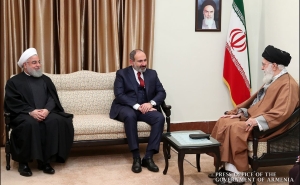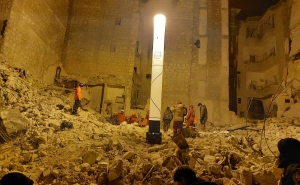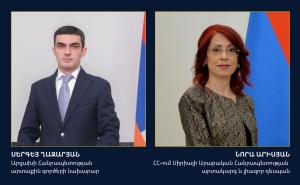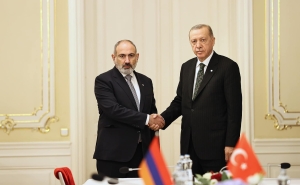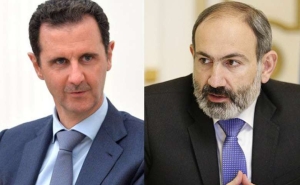The Most Intensive Military Confrontation between Israel and Iran: What Are the Implications?

The tension between Israel and Syria, which is said to be the most intensive military confrontation since the civil war began in Syria in 2011, continues to dominate the world’s attention. Below let us provide a brief review on the sequence of the developments of the events, refer to the reactions of the main international actors and make some predictions how it can affect the situation in Syria in the future.
To remind, on May 10, Israeli missiles struck dozens of Iran-linked military targets in Syria. As said, it was in response to the Iranian rocket strikes in the Golan Heights. According to the Israeli sources it was the first time that Iranian forces have fired directly on Israeli troops. After the attacks, Iran’s foreign ministry, Bahram Qasemi, came up with the statement calling attacks of Israel breach of the national sovereignty and territorial integrity of Syria, noting that Syria has the right to defend itself "against the aggressors," Independent reports. In its turn Israeli Defense Minister Avigdor Lieberman noted: "They need to remember the saying that if it rains on us, it'll storm on them. I hope we've finished this episode and everyone understood," Financial Express reports.
The tensions escalated in the Middle East two days after the US President Donald Trump declared about the US exit from the Iran nuclear deal. After the exit of the deal, the US Treasury Department announced a new set of sanctions against Iran. Acting jointly with the United Arab Emirates, the US introduced new sanctions on a financing network and accused the country’s central bank of helping funnel U.S. dollars to the blacklisted elite military unit known as the Quds Force, the Wall Street Journal reports.
On the contrary, Russia stayed determinant to cooperate with Iran. In particular, Russian President Vladimir Putin's foreign affairs adviser Yuri Ushakov said the deal between Iran, Russia and other members of the Moscow-dominated Eurasian Economic Union is set to be signed next week. In addition, the Russian official noted that the US move will make Russia and the European countries closer as president of Russia is having discussions with European leaders on the issue, ABC News reports.
As for the Iran-Israel tension the official statement by Russia stated that Israeli strikes marked a dangerous escalation and urged both Israel and Iran to avoid provoking each other, while the White House swiftly condemned Iran's "provocative rocket attacks from Syria against Israeli citizens" and expressed strong support for "Israel's right to act in self-defence," Independent reports.
The UN secretary-general Antonio Guterres, called for an immediate halt to "all hostile acts" to avoid "a new conflagration" in the Middle East, CBC News reports, while the European Union called reports about Iranian strikes against Israeli army posts from inside Syria "extremely worrying" and said Israel had the right to defend itself, Independent reports.
The direct confrontation of Iran and Israel in Syria will, unfortunately, further deteriorate the situation on the ground, drawing further dividing lines between the main players involved. In addition, the conflict of interests also raises the possibility of new confrontations, which cannot but cause new human casualties and sufferings, making Syrian people again become the victims of various political interests.
Other materials on this subject
- Turkey Is Ready For a New Military Operation in Northern Syria Kalyn said. He also added that in the event of a threat, ''an assessment will be made and everything necessary will be done.''
- Russia, Iran and Turkey Discussed the Turkish Operation in Syria Russian side tried to convince Ankara to solve the problem by peaceful means, without resorting to violence.
- US Forces in Syria Attacked after Air rRids on Armed Groups Iran-backed armed groups had earlier promised to retaliate after the US launched several air raids on the groups in Iraq and Syria on Sunday.
- Syria: Assad's Baath Party Wins Majority in Parliamentary Polls More than 7,000 polling stations were set up across government-controlled parts of the country. Voting also took place in former opposition-held areas for the time since government forces retook much of...
- Russia, China Veto U.N. Approval of Aid Deliveries to Syria from Turkey The Security Council will now vote on a rival Russian text that would only approve one Turkish crossing for aid access for six months. During the coronavirus pandemic the council has been operating virtually,...
-
 17:08
17:08The regular session of the Anti-corruption Policy Council takes place in Jermuk
-
 15:05
15:05The Prime Minister sends congratulatory messages to the supreme leader of Iran and the President of Iran
-
 11:11
11:11Armenia sends earthquake aid to Turkey
-
 10:43
10:43Commemoration of the Pontiff St. Sahak Partev
-
 09:16
09:16Some roads are closed and difficult to pass in Armenia
-
 19:55
19:55Phone conversation of the Foreign Minister of Armenia with the U.S. Assistant Secretary of State for European and Eurasian Affairs
-
 18:30
18:30Prime Minister Pashinyan and President Khachaturyan meet
-
 18:20
18:20Ararat Mirzoyan with Co-Chairman of the OSCE Minsk Group of France Brice Roquefeuil
-
 17:01
17:01Humans could land on Mars within 10 years, Musk predicts
-
 16:45
16:45France, US urge 'immediate' end to Nagorno Karabakh blockade
-
 16:01
16:01Blockaded Nagorno Karabakh launches fundraiser to support quake-hit Syria
-
 15:59
15:59Earthquake death toll in Turkey rises to 18,342
-
 15:43
15:43Ararat Mirzoyan Held a Telephone Conversation with Sergey Lavrov
-
 15:06
15:06French president rules out fighter jet supplies to Ukraine in near future
-
 14:47
14:475 Day Weather Forecast in Armenia
-
 14:44
14:44President Vahagn Khachaturyan wrote a note in the book of condolences opened in the Embassy of Syria in Armenia
-
 14:20
14:20Azerbaijan’s provocations impede establishment of peace and stability – Armenian FM tells Russian Co-Chair of OSCE MG
-
 12:57
12:57France representation to OSCE: Paris calls on Azerbaijan to restore freedom of movement through Lachin corridor
-
 11:40
11:40Command of Kosovo forces highly appreciated preparation of Armenian peacekeepers
-
 10:16
10:16The United States withdrew from sanctions against Syria for six months the provision of assistance after the earthquake
day
week
month
Humidity: %
Wind: km/h


